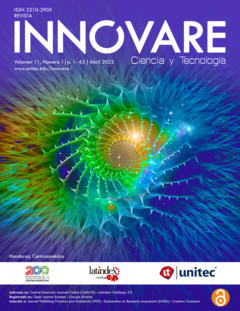Preferred educational platforms for E-learning in a Honduran educational center during the COVID-19 pandemic
DOI:
https://doi.org/10.5377/innovare.v11i1.14075Keywords:
COVID-19, Education, School, E-learning platforms, Education trinomialAbstract
Introduction. COVID-19 constitutes a global public health crisis, with education being one of the most affected social sectors. This study described the acceptance of virtual education platforms by the educational trinomial (family, student, teacher) of an educational center. Methods. A mixed methods study was implemented, with a probabilistic sample of 98 participants in an educational center in northern Honduras. A quantitative survey was applied to collect demographic data and knowledge on technological literacy knowledge by the students and parents. Qualitative semistructured interviews were applied to 21 teachers, and 98 parents or students in order to evaluate their E-learning perceptions, as well as to a panel of eight experts. The experts evaluated four E-learning platforms: Microsoft Teams for Education, Moodle, ClassroomApp y EduBox through a weighting table from 1 to 5. The study was carried out from April to October in 2020. Results. The use of technologies for virtual classes was 69.0% by preschool and first basic cycle students. The ClassroomApp platform had the highest score (3.74 out of 5.00), while EduBox had the lowest score (3.35). Conclusion. ClassroomApp best adapted to the needs of an educational center in northern Honduras, with the highest score, given by the expert panel, based on quality indicators.
Downloads
1636
PDF (Español (España)) 488
Published
How to Cite
Issue
Section
License
Copyright (c) 2022 Ariel Lozano, Gracia Sequeiros

This work is licensed under a Creative Commons Attribution-NonCommercial-NoDerivatives 4.0 International License.




